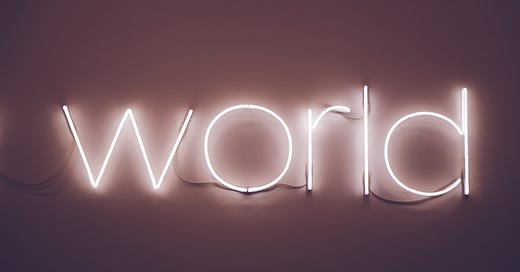The world needs your unique take on what’s happening in the world—socially, culturally, politically, environmentally, cosmically. I'm a big believer in this. It’s how we get a bigger picture view of what’s happening, and tap into insights that are uniquely coming through each of us.
But if I’m being honest with you. I struggle to do this. Especially the sharing side of that equation. There’s a lot of risk and fear that comes along with sharing my unique views (or any views) these days. So I wanted to dig into that. I’m using this share to dive into:
1. Why it's so hard to come up with our own unique takes on what's going on globally, societally, culturally, politically these days.
2. Why it's also really challenging to share that with others, to be open about that.
3. Some principles of practice that I've been arriving at and am hopefully putting into practice even by sharing this.
The video came out a little jumbled ideas-wise, but hey, that’s okay. Some themes it touches on are:
Systems thinking and the skills we need as everyday people to do it
Divergence of opinion, building our capacity for it
Knowing what spaces and relationships are safe to process in
Boundaries when engaging others about the world, sharing my opinion
Looking forward to your thoughts on this one! It’s inspired by a piece I did a few years back.
Thanks for being here and being you. Much love!
Coming up with our own answers
Let's start with coming up with our own answers about what's going on. Why it’s so hard.
Our world is loud and grabby and opinionated, and the issues that we're up against, the changes that are going on, have such an urgency to them. I know in the circles that I run in, so many of us, we just want to be good people, right? We want to make sure that we're on the right side of history. We want to show up for what's going on and respond. This political activation is beautiful and awesome.
But because of how loud and grabby and opinionated the world is, and how urgent these topics and issues are, it can be really hard to come up with our own take on things. Not to mention, we live in digital landscapes full of echo chambers where we just see the same political ideology reflected and bounced off of each other.
I think there is a growing movement and a growing call amongst people for more political diversity, for exposure to different ideas and perspectives. I think a lot of times about systems thinking and even how it's kind of been forced on us as a people these days to adopt more of a systems thinking mentality, purely by this age of information that we live in, and being able to tap into so many different corners of the world and learn about so many different aspects of our system and how they interconnect.
This systems thinking paradigm that has been shaping a lot of different disciplines and fields of practice and industries is also something that we as just everyday people are being invited into too. So one of the capacities or skills within systems thinking or taking a systems thinking lens is also looking at a singular issue and looking at it from a whole systems perspective—looking at it from different angles in order to really understand it holistically.
But that's difficult to do in this world, in this digital age, where so many of these issues really get flattened and the nuance and complexity of them get stripped away. And, you know, we could go down a whole rabbit hole of what feeds into that in terms of these media platform algorithms and how they really incentivize kind of clickbaity content, sound bites, and posts that lend themselves to the oversimplification or the flattening of these issues that actually have a lot of depth and nuance and complexity to them.
Space to digest everything
So, right, it's hard to come up with our own answers about things because these topics that we're talking about are just complicated. But then another thing is that we don't have the space to be able to digest everything that we are learning and taking in. Most social spaces and many relationships for people don't feel supportive or constructed to do so.
I know for me personally, using my voice and putting myself out there around my personal take on what's going on in the world these days, there's a real risk of being misunderstood. There's a real fear of being dogpiled on.
In this digital age, there's a fear of something I say being used against me, which unfortunately happened to me several years ago and really has thwarted me in feeling comfortable to be out in the internet.
So the solutions that I've been arriving at for myself within this is, one, really recognizing where it is constructive and supportive and, dare I say, even safe to process what's going on in the world and come up with my own answers. You know, those kinds of spaces are few and far between, but I'm a big proponent of making those more accessible. That's what I do in my Circles and my workshops.
When I share I practice grounding myself in knowing who I am
So that's the one thing. And then the next one is around when I do practice engaging with others and voicing my opinion and even voicing things publicly. I really ground myself in knowing who I am, knowing my values, knowing what I stand for, and really trusting in that. Giving myself a lot of grace and humility that I'm always allowed to change my mind. And it's a good thing to change my mind, to be in a state of evolution in my perspective and views and opinions and everything like that, and just for me as a human.
But really, grounding myself in that and then from there, knowing that whatever comes my way in terms of pushback, in terms of energies, other people's energies, other people's interpretations of what I say—that I can handle it.
And I feel confident in my ability to handle it because I've been doing a lot of work on my side of the street on things like staying grounded and regulated in the face of high degrees of emotional energy. Knowing my boundaries. Know when somebody pushing back on something that I say, whether it crosses a line for me or not. You know, does it go on to attacking my character? Is it so emotionally charged that it's belligerent and therefore not really actually something that can be engaged with in like a human-to-human respectful way?
Leaning into divergence
Going hand in hand with that too is leaning into divergence. I think it's both a reflection of the political landscape we're in and also some of the circles that I run in of healers and spiritual folks there's such a tendency to want to all agree on things. Like the seeing harmony to mean that we're all converging around the same idea, or we all walk away agreeing on the same thing, then that's a sign of success. When in reality, divergence and diversity of thought and opinion and experiences is the wealth of life. It's what makes an ecosystem healthy within the natural world, and it's what makes our society healthy as well.
So really both building my own capacity for divergence, which includes practices of emotional mindfulness and body awareness. Noticing what arises in me when there is a difference of opinion that is presented to me. And again, doing so with a mindfulness of my own boundaries, right? Is this person approaching me and engaging with me in a way that is healthy and respectful? And if not, you know, getting off the carousel, because some people just want to get caught in the carousel.
So, yeah, these are some of my reflections on just reasons why it's hard to come up with our own answers about what's going on in the world, and then also why it's difficult to share them with others, whether it's in one-on-one situations or like this, in a more public setting.
"My main issue with discussing politics is we aren't all in the same situation. It makes sense our political views don't line up."
So, yeah, thanks so much for tuning in and checking this out. And I would love to hear—well, actually, I see a comment coming in from Matt: "My main issue with discussing politics is we aren't all in the same situation. It makes sense our political views don't line up."
That's absolutely right. I totally feel that. Thanks for that, Matt. You know, and what I was saying earlier too, is around how, from a systems thinking perspective, it’s really to our benefit to put ourselves in each other’s shoes and see the situation from each other’s shoes. There’s huge value in that.
It reminds me of the ancient Indian myth around the blind men coming up to an elephant and each—each person, it’s like, "Oh no, what do we stumble upon? This is like a paintbrush," says the person at the tail. "This is like a hose." "No, no, no, this is like a stump," right? When in reality, each person has really key and interesting information about what they're encountering.
So yeah, I think the more that we can build our own capacity—or this is the invitation that I pose to myself—the more I can build my capacity, especially at the emotional level, at the psychological level, at the spiritual level, including also at the intellectual level for that divergence—to be able to meet it and hold it without collapsing. And then recognizing when it does start to brush up against or activate emotional energy in a way that isn't constructive, in a way that's like, "Okay, cool, let's actually tap out for a second. Let's actually go take a breather, take a walk, and we can try this again another time." Definitely an ongoing practice, but an important one
















Share this post